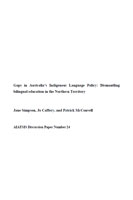Gaps in Australia's Indigenous language policy: dismantling bilingual education in the Northern Territory
Young children learn best when taught through their mother tongue. This commonsense principle has been supported by decades of research on bilingual education for children who don't speak the dominant language. The research has also shown that there are positive effects on children’s cognitive development if they are encouraged to become strong bilinguals. For Indigenous communities, bilingual education has been highly valued not only because it helps children maintain Indigenous languages, but also because it provides an honoured place for Indigenous languages in the curriculum and an honoured place for Indigenous teachers. However, in the Northern Territory bilingual education has been a controversial issue since its inception in the 1970s. In part this is due to the failure of policymakers to recognise that children who are monolingual in a language other than English need explicit teaching of the English language, by trained English as a Second Language (ESL) or English as a Foreign Language (EFL) teachers, before they can learn through English as the medium of instruction. Consequently, there has been much political debate on the issue and frequent moves against bilingual education.
At the end of 2008 the Northern Territory Government, supported by the Commonwealth Government, all but closed bilingual education in remote Indigenous schools by determining that the language of instruction for the first four hours of school must be English. This decision could spell the death of the remaining endangered Indigenous languages in Australia. Yet it was taken without apparent regard for the evidence from research on how monolingual children learn a second language, or on the positive value of bilingual education, or the language rights of Indigenous peoples, or the evidence from schools which had abandoned bilingual education.
Here we argue that the policy gap revealed by this event should be filled by a national commitment to serious consideration of evidence, and recognition of Indigenous language rights. Through national and international evidence this discussion paper outlines the cognitive, societal and education benefits of bilingual education for children whose first language is not English. It is anticipated that this paper will stimulate political discussion on using evidence-based research to improve education for Australia’s Indigenous children.
